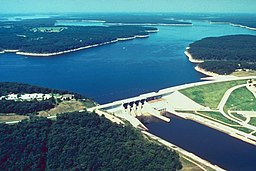Salt River (Missouri)
| Salt River | |
| Country | United States |
|---|---|
| State | Missouri |
| Source | Mark Twain Lake |
| - location | Florida, Monroe County |
| - elevation | 607 ft (185 m) |
| - coordinates | 39°30′07″N 91°46′51″W / 39.50194°N 91.78083°W |
| Mouth | Mississippi River |
| - location | Louisiana, Pike County |
| - elevation | 449 ft (137 m) |
| - coordinates | 39°28′00″N 91°03′48″W / 39.46667°N 91.06333°WCoordinates: 39°28′00″N 91°03′48″W / 39.46667°N 91.06333°W |
| Length | 55 mi (89 km) |
| Basin | 2,518 sq mi (6,522 km2) |
| Discharge | for New London, MO |
| - average | 2,120 cu ft/s (60 m3/s) |
| - max | 107,000 cu ft/s (3,030 m3/s) |
| - min | 9.5 cu ft/s (0 m3/s) |
|
Map showing major rivers in the state of Missouri. The Salt River is at the upper right near the Mississippi River.
|
|
The Salt River is a tributary of the Mississippi River in eastern Missouri in the United States. The river is approximately 55 miles (89 km) long and drains an area of 2,518 sq mi (6,520 km2) in parts of twelve Missouri counties.
It rises at the confluence of the North, Middle, and South Forks in Monroe County. Since Clarence Cannon Dam construction was completed in 1983, the first 15 miles of the Salt River after the confluence of the North, Middle, and South Fork have been contained in Mark Twain Lake. Below the dam, the river winds generally east for 63 miles through a rural valley surrounded by low bluffs. Below New London, it receives Spencer and Peno Creeks from the right. The Salt joins the Mississippi River at Ted Shanks Wildlife Conservation Area (River Mile 284) just above the town of Louisiana in Pike County.
The river was called "Ohaha" by the Native Americans that once lived along its course. It was also known as "the river Jeffreon" in the 1804 Treaty of St. Louis. American author Mark Twain was born in the town of Florida on the Salt River in 1835.
...
Wikipedia


